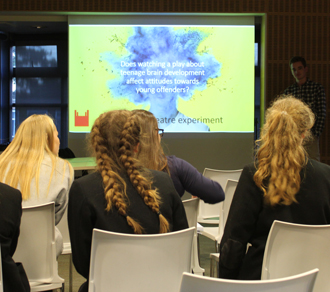Last week, Robert Blakey, a Department of Criminology PhD student at the University of Oxford, visited Bloxham and addressed our Eunoia Society students.
The main topic of discussion was his research project ‘Does watching a play about teenage brain development affect attitudes towards young offenders?’ and the conflict surrounding topics such as ‘free will’ and conscious behaviour.
The group were immediately thrown into a discussion about how an offender goes from being born with certain genetics to having the impulse to offend. Robert picked up on the term ‘free will’ and questioned whether this was obtainable as all behavioural influence must pass through the brain at some point; the brain also predicts our actions before we even know we are going to act ‘ so do we actually have free will and control over our actions, even when we offend?
This swiftly led to whether the Law was correct in punishing offenders if they had no ‘free will’ over their actions. Robert suggested that if the decision to offend was affected by a previous event in history, which was itself affected by an earlier event (and so on), was it the offender’s fault if their decision to offend originally sparked from an event that occurred before they were even born? Conversely, looking from a more neurological perspective, what if the offender’s genes and chemical makeup played a part in their decision to offend? Was the Law correct in punishing these offenders? Robert expressed his view on how having ‘no free will’ was a double-edged sword: the offender doesn’t have any control or ‘free will’ over their actions so they shouldn’t be punished, but does this give them the opportunity to offend with another, maybe more serious crime?
Robert then moved on to his research project, the results he obtained, and the conclusions he made from the statistics. He had found a play in London that focused on teenage brain development and young offenders and had asked around 700 visitors to take part in a short survey. He asked some of the participants to answer the survey before the play, and the rest to complete it after the play. The collated data showed that the public thought that young offenders were less responsible than adult offenders after having offended for the third time both before and after the play. Robert also asked about the probability that an adult and a teenage offender would offend again, with the majority of those who took the survey before thinking that both would reoffend. However, those who took the survey after thought that the teenage offender was less likely to reoffend, but the adult still was.
We concluded that neuroscientific awareness altered public opinion about offenders and the danger they pose to society. Additionally, the play became an essential tool in educating the public on teenage offenders and their moral responsibility. Robert managed to outwit us as an audience time and time again and provided a thought provoking perspective on offenders and freedom of choice.
A huge thank you to Lower Sixth Form student Carolina Hughes for this brilliant report, and for Robert Blakey for giving up his time to visit Bloxham and provide our Eunoia students with a powerful, though-provoking lecture.


